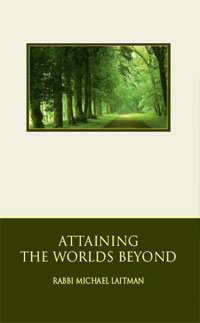Swimming in an Ocean of Light
The Light of the Creator fills all of creation. Although we swim inside this Light, we cannot perceive it. The pleasures that we feel are but tiny rays, which, with the Creator’s mercy, reach us; since without any pleasure we would end our existence.
We feel these rays as forces that attract us to certain objects, into which the rays enter. The objects themselves are of no consequence, which becomes evident to us when, at some point, we stop being interested in things that once posed a great attraction to us.
The reason for receiving only the small amount of Light, rather than the entire Light of the Creator, is that our egoism acts as a barrier. If our egoistic desires are present, we cannot perceive the Light, due to the law of the congruence of qualities, the law of likeness.
Why Don’t We Perceive the Creator?
Two objects can perceive each other only to the degree to which their qualities coincide.
Even in our own world, we can see that if two people are on completely different levels of thought and desire, they cannot understand each other.
Thus, an individual possessing the qualities of the Creator would simply be immersed in the unbounded ocean of pleasure and complete knowledge.
But if the Creator fills everything with Himself, and there is no need to look for Him as for some precious object, then, evidently, He does not merit consideration as a “reward.” Similarly, we cannot apply the concept of work to the search for Him, since He is around us and inside us.
We may not perceive Him, but He is within us, within our faith. At the same time, once we perceive Him, and receive pleasure from Him, it cannot be said that we were rewarded. After all, if there is no work done, and the object in question is found in abundance in the whole world, then this object cannot be considered a reward.
The Creator’s Concealment Shields Us from Shame
The question remains, then, what is our reward for resisting our egoistic nature?
First, we must understand why the Creator instituted the law of congruence. As a result of this, though He fills everything, we are unable to perceive Him because He conceals Himself from us.
The answer to the question: “What is our reward for resisting our egos?” is as follows: The Creator instituted the Law of Congruence. This enables us to perceive only those objects on our own spiritual level. Thus, we are prevented from experiencing the most dreadful feeling from our egoism (that is the nature of the creations) when we receive pleasure from Him—since along with the pleasure the feelings of shame and humiliation set in.
Naturally Repelled by Self-Humiliation
Egoism cannot withstand this feeling. If we are unable to justify bad actions to ourselves or to others; if we are unable to find any extraneous circumstances that have supposedly forced us, against our will, to carry out the bad deed; then we prefer any other punishment except the feeling of humiliation of the “self,” because the “self” is the pillar of our existence. Once it is humiliated, the “self” disappears spiritually; it is as if we had disappeared from this world.
How Much Can We Please the Creator?
But when we reach such a level of understanding that our only desire is to give everything to the Creator, and when we are constantly preoccupied with the thought of what else we can do for the sake of the Creator, then we will discover that we were created in order to receive pleasure from the Creator, and the Creator desires only that. At that point, we receive all possible pleasures because we want to carry out the Will of the Creator.
In such a case, there is no place for feelings of shame, because the Creator shows us that He wishes to give us pleasure, and He wants us to accept it. Thus, by accepting, we are carrying out the Will of the Creator, rather than personal egoistic desires. As a result, we become analogous to the Creator in qualities, and the screen disappears. All this ensues because we have reached the spiritual level at which we can give pleasure, just like the Creator.
Acquiring Altruistic Qualities to Please the Creator with
From the above, we can conclude that our reward for efforts made should consist of receiving new, altruistic qualities—desires to “give” and aspirations to provide pleasure—similar to the desires of the Creator toward us. This spiritual level and these qualities are known as “fear of the Creator.”
 “How We Can Become Similar to the Creator” is based on the book, Attaining the Worlds Beyond by Dr. Michael Laitman.
“How We Can Become Similar to the Creator” is based on the book, Attaining the Worlds Beyond by Dr. Michael Laitman.

